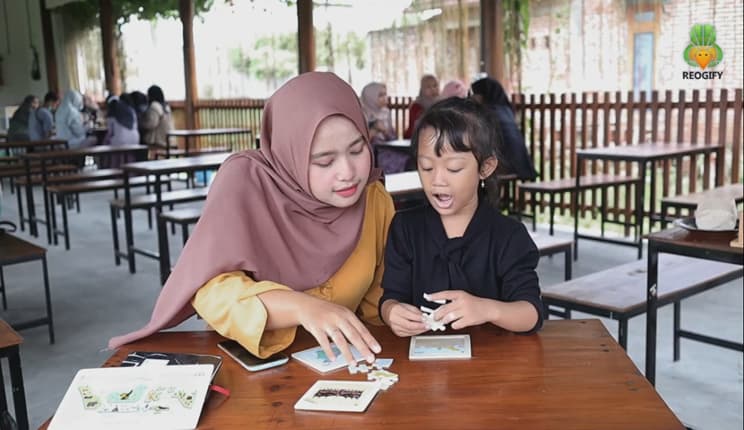Loving the Homeland through the Nationalist Puzzle Game
May 9, 2024

Nationalist Puzzle is an educational game developed by the Aces Indonesia team. The puzzle consists of three groups of pictures: a) Map of Indonesia, b) Map of islands in Indonesia, and c) cultural wealth in various regions in Indonesia. The nationalist puzzles are made from a simple material around us, such as sticker paper, cardboard / thin wood.
Nationalist Puzzles can be played by 4-10 year old children. There are no differences between men and women in this game. Nationalist Puzzle Game is classified as an individual game because the number of pieces is relatively small, that is 9-12 pieces. However, if it is implemented in a group, it can still be done, as long as one child plays one puzzle or takes turns.
Apart from being a fun activity, the Nationalist Puzzle also provides a real benefits for the children development aspect. The Nationalist puzzle benefits for children are :
a. Instilling the love homeland character
Through the character of the nationalist puzzle game, children will get to know about the Indonesian state, get to know the islands in Indonesia, and get to know the diversity of cultures that exist in Indonesia. By starting to introduce it to the children, expected that they can instill a sense of love for their homeland. Children will also feel amazed and proud of the cultural diversity in Indonesia.
b. Practicing Eye Hand Coordination
Eye hand coordination can be practiced by matching the pictures of each piece of the puzzle and then the hands move to pick and match them. This activity seems easy for adults, but requires more practice for children. The puzzle game can be a stimulus for the children’s five senses coordination, especially the eyes and hands.
c. Develops the Fine Motoric aspects of the child.
The Nationalist Puzzle activities mostly using the hands and fingers to complete the game and it is good for children’s fine motor development. Fine motor activities in this game exist when children picking up the puzzle pieces, placing and pressing the puzzle pieces according to their place.
d. Hone problem-solving skills
The pieces of the puzzle that haven’t been arranged are a problem, when children succeed in arranging the puzzle into meaningful pictures, they have solved the problem. Meanwhile, children’s efforts in assembling the puzzle pieces into an appropriate order can hone children’s ability to solve problems.
e. Recognizing patterns and relation.
Each puzzle piece has a different shape. In arranging the puzzle pieces, children will learn about related and unrelated puzzle shape patterns. Through this small and fun thing, children have learned about the mathematical concepts of patterns and relationships.
f. Practicing social skills
If the puzzle game is played in groups, then there will be an interactions between one child to another, whether it’s interaction, cooperation, helping friends or encouraging each other. This is what makes the traditional games more beneficial for children’s development.


